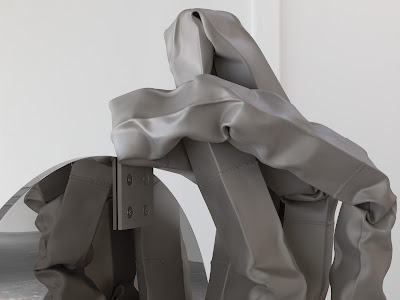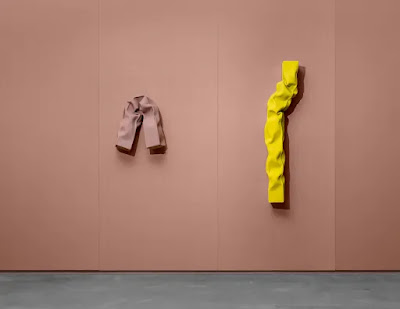 |
| Carol Bove, Vase/Face, 2022 |
Steel is one of those materials that surrounds us. Yet, despite or perhaps because of its ubiquity, we tend to ignore it. At best, we dismiss it as dull, sterile, uninspiring. Steel is the fabric and function of industrialized life, and therefore, it bears no more thinking about. Once we have seen John Chamberlain's crumpled steel sculptures, and learnt of the expressive possibility of the material, we probably won't look at steel in the same way again. Chamberlain's steel sculptures fly in the face of everything that steel is meant to do. It is meant to be stalwart and unflinching, cold and repellent. And yet, for Chamberlain, steel creates puzzles, it is an enigma, an idea without weight.
Carol Bove's current exhibition at David Zwirner's Marais gallery does something different again. Something that we would never expect steel to do. Bove makes steel into a warm material, filled with emotion, a sense of play, a material that even has the innate tendency to exude tenderness. In Bove's sculptures, steel is everything it is not meant to be.
Seeing Carol Bove's new steel sculptures on exhibition around the corner from John Chamberlain's familiar crumpled cars at Karsten Greve makes Bove's work even more peaceful, delicate, and emotionally charged. The cynic might want to say that Bove couldn't possibly do anything new with steel, that Chamberlain took steel to its ultimate beyond. But Bove's work is different, made in a different moment, speaking to a different world. Unlike Chamberlain's, Bove's sculptures are not in conversation with abstract expressionism and the fraught energy of brushstrokes by the likes of De Koonig and Kline. Her curious lengths of manipulated tubular, painted steel might be in conversation with painting. The pink, yellow and orange pieces, bent, turned, folded and scrunched together might be hung on walls, but unlike Chamberlain's, Bove's sculptures do not use the language of painting. Rather, they remind us of animated stick figures and squiggles, always about to jump off the walls and change their shape. If Chamberlain's meticulously worked, spray painted piles of steel make sense in an era when images were influenced by a need to move away from representation, Bove's connect to an era in which images are technologically determined.
 |
| Carol Bove, Vase/Face, 2022 David Zwirner |
Again in a refusal of the deterministic nature of the image today, Bove makes works that are intensely physical and material. They are strikingly sensuous - not something that can easily be said about steel. The smooth matte paint, evenly applied, bears no trace of gesture or the artist's thoughtful application (unlike the rainbow of colours sprayed and painted over Chamberlain's). But the surface is given the appearance of velvet. It is all we can do to stop ourselves from reaching out to touch them.
In Zwirner's main gallery, the sandblasted steel tubes are contorted and crumpled, folded over huge glass disks, as though hugging or stroking the human-sized circular shapes. The grey walls, floor and wrought iron glass ceiling create an environment in which everything is possible. The challenge to the materials of both glass and steel through creating relationships between them that are more like friends in a grey space, turn sculptures into living, breathing beings that shift and change as we walk around the gallery space, seeing them from different perspectives. There is no doubt after visiting this exhibition, that neither grey, nor steel, can be said to be the unyielding and uninteresting phenomena that the world claims them to be.
 |
| Carol Bove, Vase/Face, 2022 David Zwirner |
If Chamberlain creates a physical experience inviting us to navigate the twists and turns of newly manipulated metal scavanged from scrap heaps and abandoned cars, commenting on capitalism, car culture, the hard edged industrial world that has gone awry, Bove's is a world in which our eyes and our emotions come into conversation. Her works don't so much shape space as Chamberlain's do. But they do push our senses to limits that they have not otherwise been challenged to go.


No comments:
Post a Comment